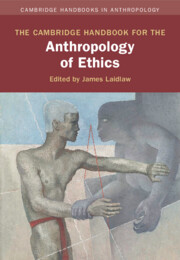Book contents
- The Cambridge Handbook for the Anthropology of Ethics
- Cambridge Handbooks in Anthropology
- The Cambridge Handbook for the Anthropology of Ethics
- Copyright page
- Contents
- Contributors
- 1 Introduction
- Part I Intellectual Sources and Disciplinary Engagements
- 2 Moral and Political Philosophy
- 3 Virtue Ethics
- 4 Agonistic Pluralists
- 5 The Two Faces of Michel Foucault
- 6 Phenomenology
- 7 Cognitive Science
- 8 Theology
- Part II Aspects of Ethical Agency
- Part III Media and Modes of Ethical Practice
- Part IV Intimate and Everyday Life
- Part V Institutional Life
- Index
- References
5 - The Two Faces of Michel Foucault
from Part I - Intellectual Sources and Disciplinary Engagements
Published online by Cambridge University Press: 11 May 2023
- The Cambridge Handbook for the Anthropology of Ethics
- Cambridge Handbooks in Anthropology
- The Cambridge Handbook for the Anthropology of Ethics
- Copyright page
- Contents
- Contributors
- 1 Introduction
- Part I Intellectual Sources and Disciplinary Engagements
- 2 Moral and Political Philosophy
- 3 Virtue Ethics
- 4 Agonistic Pluralists
- 5 The Two Faces of Michel Foucault
- 6 Phenomenology
- 7 Cognitive Science
- 8 Theology
- Part II Aspects of Ethical Agency
- Part III Media and Modes of Ethical Practice
- Part IV Intimate and Everyday Life
- Part V Institutional Life
- Index
- References
Summary
This chapter examines the extensive influence of the thought of Michel Foucault on the development of the anthropology of ethics. In doing so it treats a classic question that has preoccupied biographers of Foucault and chroniclers of his philosophy, as well as both advocates and critics of the anthropology of ethics, namely the nature of the relationship between power and freedom. Siding with those who have seen more continuity than rupture in the shifts of emphasis within Foucault’s oeuvre, it argues that we should as far as possible seek to understand the different stages of Foucault’s work as complementary, rather than contradictory: as providing us with different viewpoints from which to view a context or question, rather than mutually exclusive descriptions.
- Type
- Chapter
- Information
- The Cambridge Handbook for the Anthropology of Ethics , pp. 130 - 154Publisher: Cambridge University PressPrint publication year: 2023

